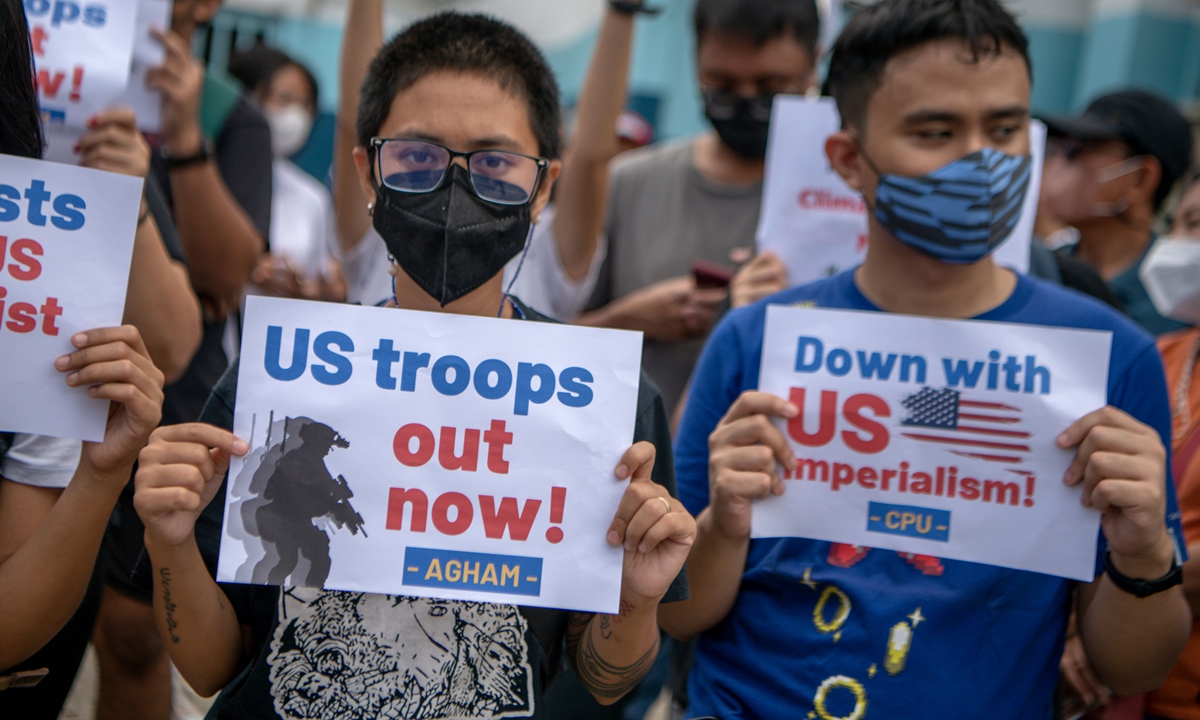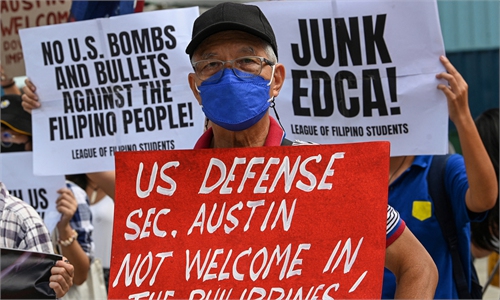US intensifies military attempts in the Philippines, to 'tie Manila closer to its geopolitical chariot'

Photo: CFP
In a latest move to tie its Southeast Asian ally tighter to its geopolitical chariot, US State Secretary Antony Blinken and Defense Secretary Lloyd Austin will meet their Philippine counterparts next week, following the announcement of four additional US military bases in the Philippines that are believed to directly target the South China Sea and China's Taiwan.
Experts said the latest military cooperation move between US and the Philippines is more symbolic than practical, but warned that Washington could sabotage the ASEAN centrality in the regional architecture and even trigger an arms race among countries in the region.
The 2+2 meeting follows the announcement on Monday that Manila will allow US military forces to access four additional bases.
Three of the sites are in the northern Philippines, including a naval base at Cagayan's Santa Ana, which is only about 400 kilometers from China's island of Taiwan. Another is on Balabac Island near the South China Sea, according to media reports.
"These new locations will strengthen the interoperability of the United States and Philippine Armed Forces and allow us to respond more seamlessly together to address a range of shared challenges in the Indo-Pacific region," said deputy Pentagon press secretary Sabrina Singh on Monday.
Chinese Foreign Ministry spokesperson Mao Ning slammed the US' strengthened military deployment in the region on Tuesday, saying the move is driven by a zero-sum mentality in pursuit of selfish interests, which would only lead to more tensions and less stability in the region.
US Forces already had access to five military bases under the 2014 Enhanced Defense Cooperation Arrangement, and the new deal will allow the US to rotate troops to a total of nine bases throughout the Philippines and store military equipment and supplies.
"The bases mainly serve three purposes of the US. First, to meet the needs of its military deployment in the Taiwan Straits and second, to enhance US military presence in the First Island Chain - specifically, strengthening control over the Bashi Channel, a critical pathway where the Chinese People's Liberation Army Navy to enter and exit the First Island Chain. And third, to serve its military operations in the South China Sea," Chen Xiangmiao, director of the World Navy Research Center at the National Institute for South China Sea Studies, told the Global Times on Wednesday.
The base announcement was met with opposition from local officials in the Philippines who expressed concern about being caught up in a future conflict between the US and China, or jeopardizing Chinese investment and becoming a target in a potential conflict across the Taiwan straits.
"If there is a superpower that is in decline and that is the United States, and another great power that is in ascendance which is China… for the Philippines to stand in the way of either the US or China, then there is a sure chance that the Philippines [will] be crushed in the process," said Dr Melissa Loja, a Filipino international maritime law expert on Monday, the South China Morning Post reported.
The Philippines is trying to strike a balance between China and the US, experts noted. While having its own considerations, it is difficult for Manila to pursue its diplomatic and military policy independently, and it is bound to make some compromises to the US.
"However, the Philippines knows clearly that no good comes from getting caught up in the US' Indo-Pacific strategy. Moreover, it has thriving economic and trade ties with China which will bring pragmatic benefits that the US cannot provide," Zhou Fangyin, a research fellow at the Guangdong Institute for International Strategies, told the Global Times on Wednesday.
Zhou said the latest military cooperation move is more symbolic than practical, because the Philippines does not truly believe that the US will go very far in helping its country with security. Manila still questions on the commitments that Washington has made, and that is why the military bases only allow the US to rotate troops but not station troops there permanently.
Chen noted that the military bases could intensify military competition in the region and thus challenge or even sabotage the ASEAN centrality in the regional architecture. It could also trigger an arms race among countries in the region, which would pose a serious threat to regional peace and stability.


